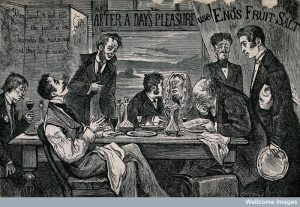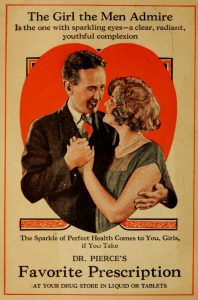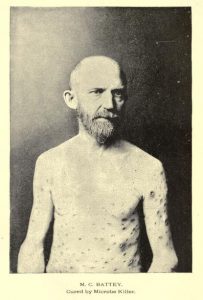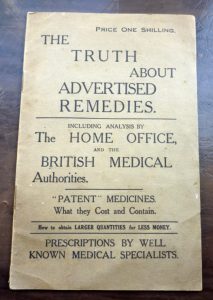Books & Pamphlets

A Patent-Medicine Song, 1892
Some of the most famous patent medicine brands of the late Victorian era found their way into this humorous song by John Johnston, MD, in 1892. Originally from Dumfriesshire, Johnston settled in Bolton in the 1870s and worked as a general practitioner, also devoting time to literary pursuits. During the 1880s he became a regular […]
Read More
The sparkle of perfect health
ADvent Calendar Day 12 The Favorite Prescription was just one part of a range marketed by Dr Ray Vaughn Pierce in newspapers, almanacs, pamphlets and on the side of barns across the late 19th-century US. After his death in 1914, his profitable business continued in the hands of his son, Dr Valentine Mott Pierce, and […]
Read More
An ulcer as big as a hen-egg
Patient testimonials were (and indeed remain) an integral part of the promotion of non-evidence-based health products. While 19th-century newspaper advertising only had room for concise endorsements, promotional books and pamphlets allowed medicine proprietors to give more detailed case studies of those who had supposedly benefited from their products. This one by Mr M C Battey, […]
Read More
Don’t be gulled by misleading advertisements
This 20-page booklet from about 1927 appears at first glance to be an official publication intended to raise public awareness of the ‘preposterous claims concerning so-called “patent” medicines, which are a disgrace to any civilised nation and a bar to human progress.’ The cover’s references to the Home Office and the British medical authorities, together […]
Read MoreNo glister-pipe, bum-peeping apothecary
The following speech appeared in a comic 18th-century booklet called The Harangues or Speeches of Several Famous Mountebanks in Town or Country, which makes fun of high-profile medical salesmen by attributing to them wild claims about their remedies. Later editions (under the title The Harangues, or Speeches, of Several Celebrated Quack Doctors in Town and […]
Read MorePaul Gage’s Tonic Antiphlegmatic Elixir
Source: The Liverpool Mercury, 30 December 1851 . Phlegm is generally white, greyish, or of a yellow colour, with streaks of black; its consistency varies from the limpidity of water to the thickness of jelly. This vivid description is from Parisian chemist Paul Gage’s Treatise on the Effect and Disorders produced by Phlegm in the […]
Read MoreGordon’s Vital Sexualine Restorative
STRENGTH, VITALITY, MANHOOD. A Valuable Treatise on Nervous Exhaustion, Loss of Strength, Mental Depression, Exhausted Vitality, and all special diseases and weaknesses of man; their causes, and means of cure. This book not only contains valuable remarks on how to preserve strength and retain the powers to an advanced age, but points out the best […]
Read MoreSwaim's Panacea – part 1
SWAIM’S PANACEA.—This Medicine has acquired a very extensive and established celebrity in Europe and America, and its virtues are known and acknowledged by many of the most respectable physicians of both countries. As an alterative, and in various diseases, particularly in cases of inveterate corruption of the blood descending to the second generation, it stands […]
Read MoreThe Guttae Vitae, or Vegetable Life Drops
Although no proprietor is shown in the following advertisement, the Vegetable Life Drops were one of several cures touted under the name Dr Walter De Roos. De Roos was an enigmatic character and the name was purported to be an alias for one John (or George) Robinson, who might well have bought the business in 1858 from brothers Alfred and Samuel Barker. […]
Read More